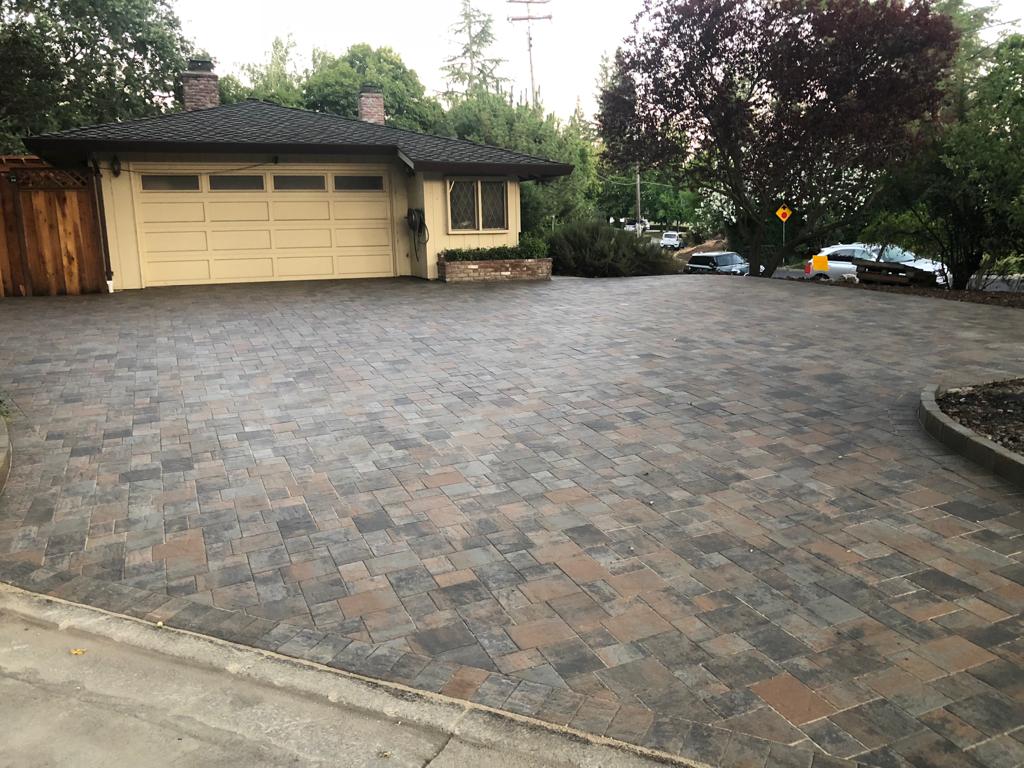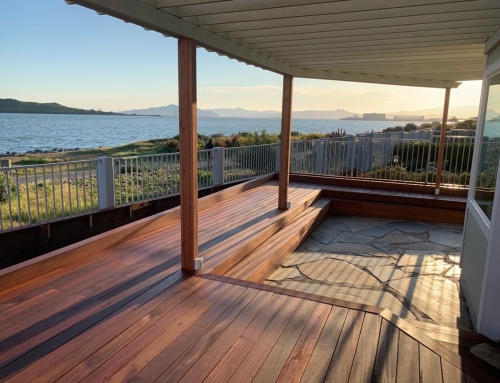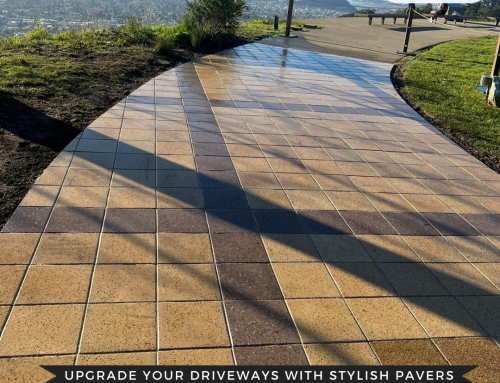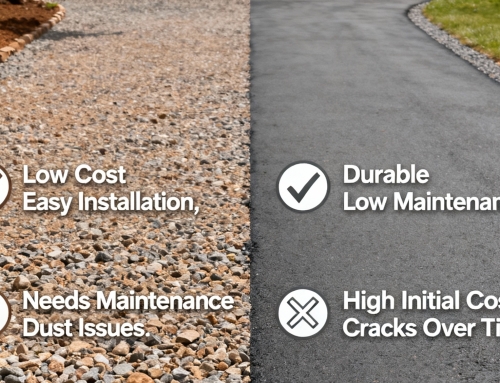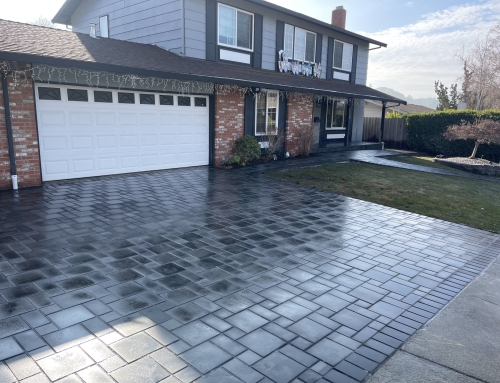When it comes to designing durable and beautiful outdoor spaces, homeowners often face a big decision: brick pavers or concrete pavers. Both options have stood the test of time, offering unique advantages and drawbacks. Whether you’re planning a new patio, walkway, or concrete driveway, understanding these materials can help you choose the best solution for your property.
As a trusted paving contractor, Smartscaping specializes in guiding homeowners through this exact decision. In this article, we’ll explore what brick pavers are, their benefits, disadvantages, and how they compare to concrete pavers.
What Is a Brick Paver?
Brick pavers are rectangular paving units traditionally made from clay that’s shaped and kiln-fired at high temperatures. Unlike poured concrete, each unit is a separate piece, allowing for flexible designs and patterns. They’ve been used for centuries to pave streets, courtyards, and driveways, thanks to their strength and timeless appearance.
A common misconception is that all pavers are “bricks.” In reality, brick pavers specifically refer to clay-based units, while concrete pavers are made from a blend of cement, aggregates, and color additives.
Where Are Brick Pavers Used?
-
Driveways – Known for their durability under heavy loads.
-
Walkways & pathways – Add old-world charm to garden trails.
-
Patios – Create an inviting outdoor living space.
-
Pool decks – Provide slip resistance with a natural aesthetic.
Brick pavers bring a classic look that concrete often can’t replicate, which makes them a popular choice for homeowners seeking elegance and longevity.
The Benefits of Paver Blocks
Before diving deeper into brick-specific advantages, it’s important to understand the general benefits of using paver blocks—whether brick or concrete.
-
Strength and Durability
Paver blocks are designed to withstand heavy foot traffic and vehicular loads. A professionally installed driveway with either brick or concrete pavers can last decades. -
Flexibility in Design
Pavers come in various shapes, colors, and textures. Whether you prefer a rustic cobblestone appearance or a sleek modern layout, there’s a paver style to suit your taste. -
Low Maintenance
Unlike poured concrete or asphalt, paver blocks are easy to maintain. If a section cracks or stains, you can replace just the affected paver instead of resurfacing the entire area. -
Weather Resistance
Paver blocks can handle harsh freeze-thaw cycles better than solid slabs. The small joints between pavers allow for natural movement, reducing the risk of large cracks. -
Eco-Friendly Options
Permeable pavers allow water to pass through, reducing stormwater runoff and helping recharge groundwater.
For homeowners considering a long-lasting investment in their outdoor spaces, paver blocks (brick or concrete) offer incredible versatility.
The Benefits of Brick Pavers
Now, let’s focus on why brick pavers remain a timeless choice for homeowners.
1. Classic Aesthetic Appeal
Nothing beats the traditional charm of brick. Its warm red and earthy tones create a timeless look that blends beautifully with almost any architectural style.
2. Color Retention
Brick pavers retain their color better than many concrete alternatives. Since the color comes from the natural clay rather than pigments, fading is minimal even under direct sunlight.
3. Strength and Longevity
Brick pavers are kiln-fired, making them extremely strong. When installed correctly by a skilled paving contractor, they can last for decades, even under the weight of vehicles on a concrete driveway.
4. Slip Resistance
The naturally textured surface of brick pavers provides excellent traction, making them safe for walkways, pool decks, and sloped driveways.
5. Low Maintenance
Brick pavers require little upkeep. Occasional sweeping, pressure washing, and re-sanding the joints are usually enough to keep them in top shape.
The Disadvantages of Brick Pavers
As with any material, brick pavers have drawbacks that homeowners should consider.
1. Limited Color and Design Variety
Brick pavers are mostly available in earthy shades of red, brown, and tan. If you’re looking for modern grays, whites, or more customized colors, concrete pavers offer greater variety.
2. Higher Cost
Brick pavers tend to be more expensive upfront compared to concrete alternatives. Both the material and the skilled labor required for installation can add to the cost.
3. Prone to Chips and Cracks
While durable, bricks can chip or crack under extreme pressure. Unlike concrete pavers, which can be manufactured to specific strength standards, natural clay has some variability.
4. Weeds and Moss in Joints
Like all paver systems, brick pavers have joints where weeds or moss may grow if not properly maintained. Regular joint sand replacement or sealing can help minimize this issue.
Concrete Pavers: A Strong Competitor
If brick pavers bring timeless beauty, concrete pavers offer unmatched versatility. They’re made by mixing cement, sand, gravel, and pigments, which allows manufacturers to create endless styles, shapes, and colors.
Advantages of Concrete Pavers
-
Wide Variety of Styles – Available in virtually any color, shape, and texture.
-
Cost-Effective – Generally less expensive than brick.
-
Consistency – Manufactured to strict standards, ensuring uniform size and strength.
-
Easy Installation – Their uniformity makes them easier to install, reducing labor time.
Concrete pavers are especially popular for concrete driveways, patios, and large-scale landscaping projects where customization and affordability are top priorities.
Brick vs. Concrete Pavers: Which Is Better?
This is the question most homeowners ask when planning their outdoor upgrades. The answer depends on your goals, budget, and long-term vision.
1. Durability
-
Brick pavers are strong and long-lasting but can chip.
-
Concrete pavers are durable too but may wear down faster if not sealed.
2. Appearance
-
Brick provides a natural, rustic, and timeless look.
-
Concrete offers more design flexibility with colors and finishes.
3. Cost
-
Brick pavers are generally more expensive upfront.
-
Concrete pavers are more budget-friendly, especially for large driveways.
4. Maintenance
-
Both require sealing and occasional joint sand replacement.
-
Brick holds its color better over time, while concrete may fade unless sealed.
5. Eco-Friendliness
-
Bricks are made from natural clay and are recyclable.
-
Concrete requires more energy to produce but offers permeable options for sustainability.
Ultimately, neither is universally “better.” If you value timeless beauty and color longevity, brick pavers might be the right choice. If you want affordable customization with a modern touch, concrete pavers may be the smarter investment.
Why Hiring a Professional Paving Contractor Matters
Whether you choose brick pavers or concrete pavers, the quality of installation determines how long your project will last. A skilled paving contractor ensures:
-
Proper site preparation to prevent settling or shifting.
-
Correct paver alignment for visual appeal and stability.
-
Use of the right base and joint materials to maximize longevity.
-
Professional sealing and finishing to protect your investment.
At Smartscaping, our team has extensive experience installing everything from concrete driveways to elegant brick patios. We guide you through the selection process, provide transparent cost estimates, and ensure flawless installation.
Which Option Should You Choose?
If you’re still undecided between brick and concrete pavers, consider these questions:
-
What’s your budget? Brick pavers cost more upfront, while concrete pavers are more affordable.
-
Do you prefer classic or modern aesthetics? Brick is timeless; concrete is versatile.
-
How long do you plan to stay in your home? If long-term durability is a priority, brick may be worth the investment.
-
Do you want low maintenance? Both require some upkeep, but brick maintains color better over time.
Final Thoughts
The choice between brick pavers and concrete pavers isn’t about which is universally better—it’s about what fits your lifestyle, budget, and design vision.
Brick pavers bring elegance, tradition, and long-lasting beauty to your outdoor space, while concrete pavers deliver flexibility, affordability, and modern appeal. Either option, when installed by an experienced paving contractor, will add value, function, and curb appeal to your home.
At Smartscaping, we help homeowners transform driveways, patios, and walkways into stunning, durable outdoor features. Whether you’re considering a new concrete driveway or want the timeless charm of brick pavers, our team ensures your project is built to last.


